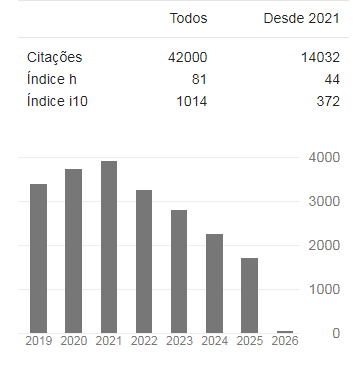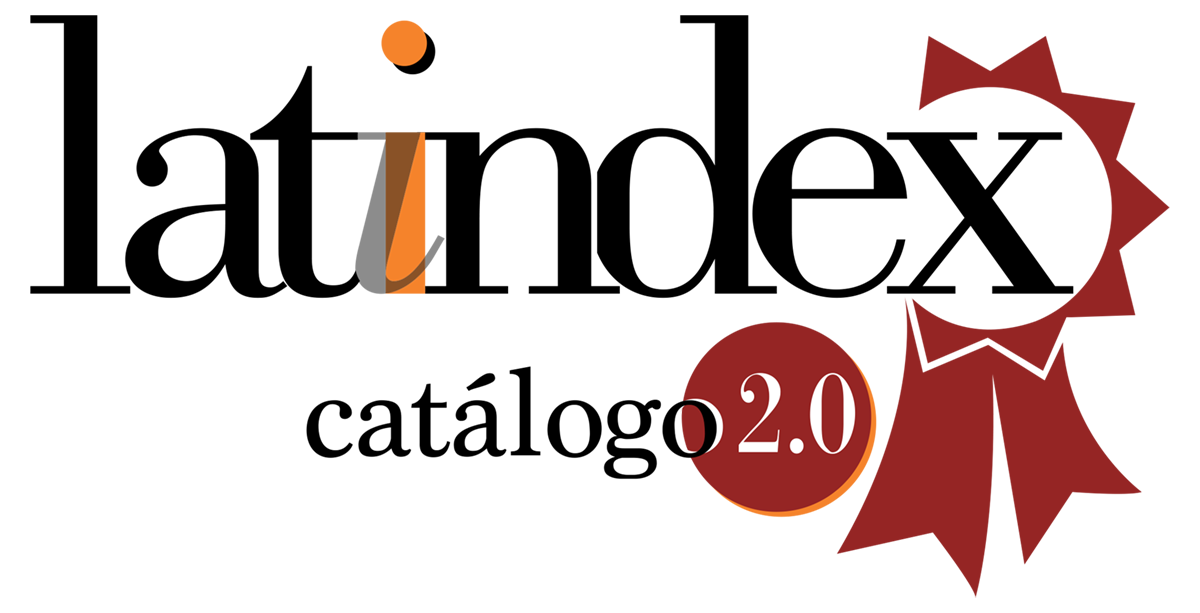Acidentes domiciliares por forças mecânicas animadas na população infantojuvenil
DOI:
https://doi.org/10.5935/1415-2762.20160024Palavras-chave:
Acidentes Domésticos, Animais Domésticos, Mordeduras e Picadas, Criança, Adolescente, Adulto JovemResumo
Acidentes por mordeduras humanas, de animais e picadas de insetos em ambiente domiciliar são importantes causas de atendimentos hospitalares na população infantojuvenil (0-24 anos). Conhecer as circunstâncias que envolvem esses acidentes é essencial para traçar as medidas preventivas e intervenções. Objetivo: analisar o perfil de acidentes domiciliares causados por forças mecânicas animadas na população infantojuvenil, atendida por serviço público de referência em urgência e emergência, durante o ano de 2013. Método: estudo epidemiológico de corte transversal com coleta retrospectiva de dados e análise quantitativa. Foram analisadas as fichas de pronto-atendimento decorrentes de acidentes domiciliares por forças mecânicas animadas na população de zero a 24 anos durante o ano de 2013, atendidas por um hospital público de referência em urgência e emergência. Os dados foram digitados no programa EPIINFO e para análise foram utilizadas estatísticas simples e bivariadas. Resultados: predomínio do sexo masculino (63,6%) e faixa etária de 1-9 anos (64,6%). A mordedura de cão representou 63,9% dos atendimentos. Entre crianças de 1-4 anos as lesões concentraram-se no segmento encefálico (62,5%) e entre 15-24 anos nos membros superiores. Houve alta em 97,0% dos atendimentos. Conclusão: evidenciou-se a importância de medidas preventivas para acidentes com forças animadas de forma que eliminem os riscos e torne o ambiente domiciliar seguro para o desenvolvimento de crianças, adolescentes e jovens.
Downloads
Referências
Ministério da Saúde (BR). Saúde Brasil 2010: uma análise da situação de saúde e de evidências selecionadas de impacto de ações de vigilância em saúde. Brasília: MS; 2011.
Organização Mundial da Saúde. Classificação Estatística Internacional de Doenças e Problemas Relacionados à Saúde (CID 10). 10ª ed. São Paulo: EDUSP; 2000.
Alavi SM, Alavi L. Epidemiology of animal bites and stings in Khuzestan, Iran, 1997-2006. J Infect Public Health. 2008[citado em 2015 jan. 16];1(1):51-5. Disponível em: http://www.ncbi.nlm.nih.gov/pubmed/20701846 DOI: 10.1016/j.jiph.2008.08.004
Martins CBG, Andrade SM. Epidemiologia dos acidentes e violências entre menores de 15 anos em município da região sul do Brasil. Rev Latino-Am Enferm. 2005[citado em 2015 jan. 16]; 13(4):530-7. Disponível em: http://www.scielo.br/pdf/rlae/v13n4/v13n4a11.pdf
Ministério da Saúde (BR). DATASUS. Indicadores de morbidade e mortalidade, 2014. Brasília: MS, 2014. [Citado em 2014 nov. 30]. Disponível em: http://www.datasus.gov.br
Junior VH, Campos Neto M F, Mendes AL. Mordeduras de animais (selvagens e domésticos) e humanas. Rev Patol Tropic. 2013[citado em 2015 jan. 16];42(1): 13-20. Disponível em: http://www.fmvz.unesp.br/Home/Pos-Graduacao/animaisselvagens/mordeduras-de-animais-e-humanas.pdf DOI: 10.5216/rpt.v42i1.23587
Moini M, Peyvandi AA, Rasouli MR, Khajei A, Kakavand M, Eghbal P, et al. Pattern of animal-related injuries in Iran. Acta Med Iran. 2011[citado em 2015 jan. 16]; 49:163-8. Disponível em: http://www.ncbi.nlm.nih.gov/pubmed/21681704
O'Neil ME, Mack KA, Gilchrist J. Epidemiology of non-canine bite and sting injuries treated in U.S. emergency departments, 2001-2004. Public Health Rep. 2007[citado em 2015 jan. 16]; 122:764-75. Disponível em: http://www.ncbi.nlm.nih.gov/pubmed/18051669
Pedrosa AAG, Mascarenhas MDM, Costa EM, Cronemberger LP. Atendimentos por causas acidentais em serviços públicos de emergência - Teresina, Piauí - 2009. Ciênc Saúde Coletiva. 2012[citado em 2015 jan. 16];17(9):2269-78. Disponível em: http://www.scielo.br/pdf/csc/v17n9/a09v17n9.pdf
Gaspar VLV, Souza ECO, Carmo JH, Pereira WD. Características de crianças e adolescentes hospitalizados em decorrência de causas externas. Rev Med Minas Gerais. 2012[citado em 2015 jan. 16]; 22(3):287-95. Disponível em: http://www.rmmg.org/artigo/detalhes/79
Melo MC, Baragatti DY, Castro D M. Representação da mortalidade hospitalar por causas externas em um município de Minas Gerais. Rev Enferm Cent-Oeste Min. 2013[citado em 2015 jan. 16]; 3(1):547-53. Disponível em: http://www.seer.ufsj.edu.br/index.php/recom/article/view/305 DOI: http://dx.doi.org/10.19175/recom.v0i0.305
Paranhos NT, Silva EA, Bernardi F, Mendes MCNC, Junqueira DMAG, Souza IOM, et al. Estudo das agressões por cães, segundo tipo de interação entre cão e vítima, e das circunstâncias motivadoras dos acidentes, município de São Paulo, 2008 a 2009. Arq Bras Med Vet Zootec. 2013[citado em 2015 jan. 16]; 65(4):1033-40. Disponível em: http://www.scielo.br/pdf/abmvz/v65n4/14.pdf
Carvalho CC, Silva, BTF . Características epidemiológicas de acidentes por mordedura de cão, atendidos em Unidade Básica de Saúde no nordeste do Brasil. Rev Bras Prom Saúde. 2007[citado em 2015 jan. 16];20(1):17-21. Disponível em: http://ojs.unifor.br/index.php/RBPS/article/view/996 DOI: http://dx.doi.org/10.5020/996
Collins NC, Molcho M, Carney P, McEvoy L, Geoghegan L, Phillips JP, Nicholson AJ. Are boys and girls that different? An analysis of traumatic brain injury in children. Emerg Med J. 2013[citado em 2015 jan. 16];30(8):675-8. Disponível em: http://www.ncbi.nlm.nih.gov/pubmed/22962053 DOI: 10.1136/emermed-2011-200496
Pereira SFA, Garcia CA. Prevenção de acidentes domésticos na infância. Rev Enferm UNISA. 2009[citado em 2015 jan. 16];10(2):172-7. Disponível em: http://www.unisa.br/graduacao/biologicas/enfer/revista/arquivos/2009-2-14.pdf
Buso DS, Queiroz LH, Silva JE. Epidemiological aspects of dog bites considering biter dogs and victims. Vet Zootec. 2013[citado em 2015 jan. 16];20(3):296-306. Disponível em: http://www.fmvz.unesp.br/rvz/index.php/rvz/article/viewFile/421/485
Vieira LJEDS, Carneiro RCMM, Frota MA, Gomes ALA, Ximenes LB. Ações e possibilidades de prevenção de acidentes com crianças em creches de Fortaleza, Ceará. Ciênc Saúde Coletiva. 2009[citado em 2015 jan. 16];14(5):1687-97. Disponível em: http://www.scielo.br/scielo.php?script=sci_arttext&pid=S1413-81232009000500010&lng=enDOI: http://dx.doi.org/10.1590
Elsevier. Animal and Human Bites. 2007. [Citado em 2014 dez. 03]. Disponível em: http://www.impcna.com/intranet/Nelson%20Pediatric/Emergency/AnimalHumanBites%5B1%5D.pdf
Khatchadourian K, Ovetchkine P, Minodier P, Lamarre V, Lebel MH, Tapiéro B. The rise of the rats: a growing paediatric issue. Pediatr Child Health. 2010[citado em 2015 jan. 16]; 15(3):131-4. Disponível em: http://www.ncbi.nlm.nih.gov/pmc/articles/PMC2865946/
Wei Y, Chen L, Li T, Ma W, Peng N, Huang L. Self-efficacy of first aid for home acidentes among parents with 0 to 4 year old children at a metropolitan community health center in Taiwan. Accid Anal Prev. 2013[citado em 2015 jan. 16];52:182-7. Disponível em: http://www.ncbi.nlm.nih.gov/pubmed/23348100 DOI: 10.1016/j.aap.2012.12.002
Silva JA, Grossi ACM, Haddad MCL, Marcon SS. Avaliação da qualidade das anotações de enfermagem em unidade semi-intensiva. Esc Anna Nery Rev Enferm. 2012[citado em 2015 jan. 16]; 16(3):577-82. Disponível em: http://www.scielo.br/scielo.php?script=sci_arttext&pid=S1414-81452012000300021&lng=enDOI: http://dx.doi.org/10.1590/S1414-81452012000300021
Yalcin E, Kentsu H, Batmaz H. A survey of animal bites on humans in Bursa, Turkey J Vet Behav Clin Appl Res. 2012[citado em 2015 jan. 16];7(4):233-7. Disponível em: http://www.sciencedirect.com/science/article/pii/S155878781100150X DOI: 10.1016/j.jveb.2011.08.008
Del Ciampo LA, Ricco RG, De Almeida CA, Bonilha LR, Carvalho dos Santos TC. Dog bites and accidents in children. Rev Saude Pública. 2000[citado em 2015 jan. 16];34(4):411-2. Disponível em: http://www.scielosp.org/scieloOrg/php/reflinks.php?refpid=S0213-9111200500010001100018&lng=pt&pid=S0213-91112005000100011
Downloads
Publicado
Edição
Seção
Licença
Copyright (c) 2017 Reme: Revista Mineira de Enfermagem

Este trabalho está licenciado sob uma licença Creative Commons Attribution 4.0 International License.





































